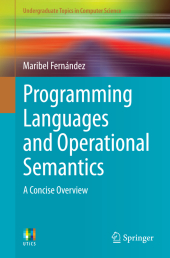 Neuerscheinungen 2014Stand: 2020-02-01 |
Schnellsuche
ISBN/Stichwort/Autor
|
Herderstraße 10
10625 Berlin
Tel.: 030 315 714 16
Fax 030 315 714 14
info@buchspektrum.de |

Maribel Fernandez
Programming Languages and Operational Semantics
A Concise Overview
2014. 2014. ix, 209 S. 10 SW-Abb. 235 mm
Verlag/Jahr: SPRINGER, BERLIN; SPRINGER, LONDON 2014
ISBN: 1-447-16367-2 (1447163672)
Neue ISBN: 978-1-447-16367-1 (9781447163671)
Preis und Lieferzeit: Bitte klicken
This concise introduction to the essential concepts in contemporary programming languages features a host of illustrative examples. It explains modern imperative, functional, and logic-based languages as well as giving readers the tools to design new ones.
This book provides an introduction to the essential concepts in programming languages, using operational semantics techniques. It presents alternative programming language paradigms and gives an in-depth analysis of the most significant constructs in modern imperative, functional and logic programming languages. The book is designed to accompany lectures on programming language design for undergraduate students. Each chapter includes exercises which provide the opportunity to apply the concepts and techniques presented.
Introduction.- Mathematical Background.- General Features of Imperative Languages.- Operational Semantics of Imperative Languages.- General Features of Functional Languages.- Operational Semantics of Functional Languages.- General Features of Logic Programming Languages.- Operational Semantics of Prolog.- Answers to Selected Exercises.
From the book reviews:
"This text can serve as a complement to traditional undergraduate programming language course resources or as the main textbook for introductory courses in programming language operational semantics. The book is well organized, flows well, and is pleasant to read. ... Summing Up: Recommended. Upper-division undergraduates and faculty." (D. Papamichail, Choice, Vol. 52 (5), January, 2015)
"There are many things in this book that would lead to its recommendation as a course textbook: it provides a good breadth of material, and a stepping stone from programming experience to more theoretical aspects of programming languages. ... it would be an excellent addition to a reference list that could be used to inform a solid understanding of programming language theory." (Sara Kalvala, Computing Reviews, July, 2014)


